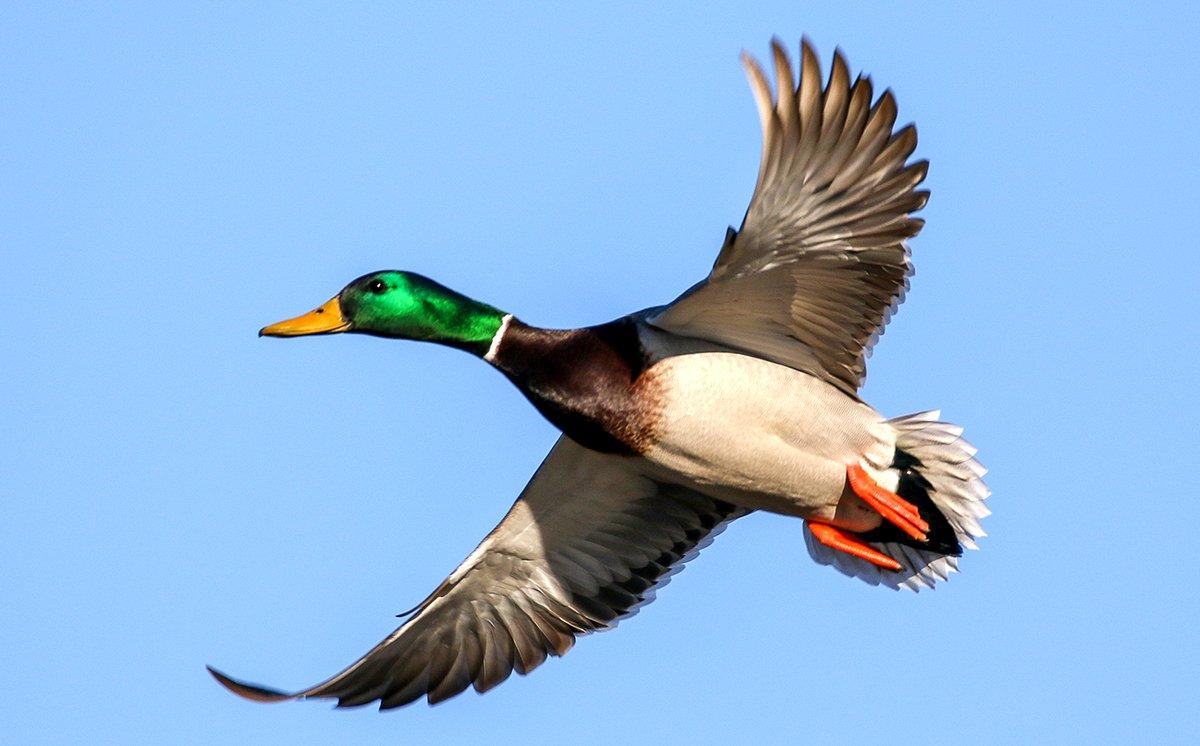In areas with water, early duck numbers in middle portions of the flyway look excellent
Frigid weather in the North has pushed many ducks, including mallards, into Missouri, Arkansas and other areas. Photo by Cody Grounds
The mercury is dropping, and the leaves have changed. The first official day of winter is still several weeks away, but many parts of the middle of the flyway are experiencing conditions commonly seen during December and January. In fact, in much of the southern Midwest and upper Southeast, lows have hovered well below freezing for a couple of weeks, with some nighttime temperatures dipping into the mid- to low teens. The early cold snap has pushed ducks farther south in large numbers.
Although part of the forecast has benefitted waterfowl concentrations, precipitation has been extremely scarce, and corresponding water levels throughout the flyway are severely lower than average. The Mississippi River is experiencing a historic drought. Measurements up and down the river have dropped to levels never seen. Many backwaters are dry, as is much of the floodplain.
The colder weather has pushed a lot of ducks south, but the lack of water makes hunting tough. Expect overcrowding on public lands, with hunters concentrating on available water sources. Birds might not be able to access sloughs and swamps they have used in the past, and hunters might be forced to find new spots until water levels rise. Try to use lower water levels to your advantage. Find new places that offer water, cover, and a food source for ducks and geese, and you’ll be sure to find a good hunt.
Eric Rinehart of North Delta Outfitters hunts in southeastern Missouri and is optimistic ahead of the upcoming opener.
“We are way ahead of schedule,” he said. “This is the earliest we’ve seen this many ducks in over 10 years. We’re seeing lots of mallards and a ton of bonus ducks, including a plethora of green-winged teal. This is the most ducks we’ve ever had without the Mississippi River flooding. It’s pretty incredible.
“It’s super dry, which is probably why we’re seeing such huge concentrations. If you have water, you have ducks. It’s been freezing every night for the past week, and they’ve been concentrating in open water. If it stays cold, I’m not sure if ducks will push out or stay. I know there are a lot of ducks south of us in northern Arkansas. If it warms up, they will bounce back and forth between northern Arkansas and southern Missouri. I would rather have ducks south of us than north of us, but it sounds like we on the X.”
Rinehart said refuges are holding lots of birds.
“Reelfoot Lake is packed,” he said. “Private land nearby should have a really good year if they can control their own water levels. Having said that, this is a year where managing your hunting pressure will be extremely important. It will be really easy to hunt your ducks too hard, since there’s only so much open water. I don’t think there will be many places for them to sit where they won’t be shot at, because people will hunt all the available water. Hunting every day will likely shoot out your spot, and ducks will get stale.”
J.D. Driskell of Dirty Rice Outfitters also hunts in southeastern Missouri and echoed Rinehart.
“Everyone is lacking water, but if you have it, you should have an abundance of ducks,” he said. “We are seeing all species of ducks and geese right now. I’m sure when the season opens and the shooting starts, the hunting pressure will force them back to their typical ways of feeding at night and hitting big water or refuges during the day. Big water and rivers that still have adequate water levels should be full of birds. The weather up north has really thrown the first part of the migration into overdrive, but it’s still early. The hunting pressure with scarce water could push them to less-pressured areas.”
Lack of water has caused problems in southern Illinois. Kent Woodrow of Illinois Whitetails and Waterfowl said drier conditions have led to fewer birds in the sky.
“We are so dry in southern Illinois that there have been very few ducks around,” he said. “I have heard that larger bodies of water, such as Rend Lake, are holding some ducks, but overall we haven’t had ducks and haven’t seen a major push. Our early teal season produced some birds, but we have seen very little since then.”
(Don't miss: The 7 Best Days of Duck Season)
Click here for more Realtree waterfowl hunting content. And check us out on Facebook.














